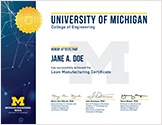PROFESSIONAL EDUCATION CERTIFICATES
Lean Supply Chain & Logistics
Home » Professional Education » Lean Supply Chain & Logistics
Key Information
Course Dates
Time Commitment
5 daysStay In Touch!
Subscribe to our newsletter for email updates on new and current course offerings.
Subscribe to Our Newsletter
By submitting this form, you are consenting to receive marketing emails from Nexus. You may unsubscribe at any time.
By clicking submit, you are agreeing to receive emails from Nexus.
See your supply chain and logistics system from a new perspective and optimize your operations.
This five-day course provides you with the tools and techniques to effectively manage your supply chain and understand how its parts work together as a system. Our faculty combines simulations, real-life case studies, hands-on activities, and in-plant tours to guide you toward achieving the right balance of people, systems, and technology to successfully compete in the global marketplace. The program features two distinct modules, which may be completed individually without earning a certificate.
LEARNING OBJECTIVES
Lean Supply Chain
- Lean methods for collaborative planning, forecasting, and replenishment
- Review the bullwhip effect and techniques to eliminate variability using better information sharing
- Assess where to keep inventory in the value chain and how to manage the inventory
- Assess and evaluate the flow of material and information in the extended value chain
- Determine how to reduce risk across the chain
- Understand how to decide what to produce and when to produce it
Lean Logistics
- Observe successful lean implementation in warehousing
- Understand how to apply lean principles in warehousing operations
- Review warehousing equipment and processes
- Assess the throughput of receiving / put-away operations and storage / retrieval systems
- Review opportunities to improve picking and inventory accuracy
PROGRAM OVERVIEW
LAPTOP REQUIRED FOR IN-PERSON OFFERINGS
- Introduction to Lean Supply Chain Management
- Importance and financial impact of the supply chain function
- Lean principles and how they apply to a variety of industries
- Identifying waste in the system
- Introduction to Inventory Management in the Supply Chain
- How to manage inventories in an organization and across the entire chain
- Identifying which parts have too much inventory and which parts have too little
- Inventory Management in the Supply Chain System, Continued
- Pull systems for inventory management
- Inventory Management Distribution Simulation
- Managing Global Supply Chains
Morning
- Partnering with Suppliers and Customers for a More Efficient Supply Chain/Logistics System
- Implementing Supply Scorecards
- Methods for Information Sharing with Suppliers and Customers
- Sourcing Strategies to Improve Performance
Afternoon
- Lean Warehouse Facility Tour
- Gemba Walk of a local warehouse to see actual processes, understand the work, and ask questions
- Introduction to Lean Logistics
- Warehouse types based on “customer”
- Applying Lean principles in the warehouse
- Lean Warehouse Simulation
- Multiple-round simulation transforms a traditional warehouse into a Lean Warehouse
- Receiving and Put-away Functions; Application Exercise
- Basic Review of Storage/Retrieval Equipment; Application Exercise
- Order Picking Functions, Order Picking Accuracy: Pick-to-Light and Voice Pick
- Inventory Accuracy in the Warehouse; Case Study
WHO SHOULD ATTEND
This program is intended for anyone who would like a better understanding of how the different parts of the supply chain work together. Directors, change agents and staff involved in supply chain management, distribution, inventory control, e-business, procurement, buying, planning, customer service, logistics, manufacturing, operations, or shipping will benefit. There will be examples and case studies from many industries.
INSTRUCTIONAL TEAM

Yavuz Bozer, PhD
- Professor, Industrial & Operations Engineering, College of Engineering

Izak Duenyas, PhD
- Associate Dean for Executive Programs, Herrick Professor of Business, Ross School of Business

